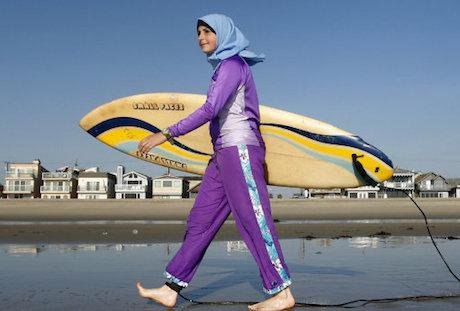
Chris Carlson/AP/Press Association Images. All rights reserved.Approximately two years ago in Turkey, there was an odd case in which AKP-allied Deputy Prime Minister Bulent Arinc made a statement declaring that it was indecent for women to laugh in public or, presumably, in mixed company.
Naturally, this statement was effectively a call to arms. Women took to social media in droves, posting pictures of themselves smiling accompanied by the hashtags #direnkahkaha (resist laughing) and #direnkadin (resist woman). Many similar stories have come out of the Middle East since the rise of social media, in which online activists and citizens protest their government’s encroachments upon their self-representation and lifestyle.
Recently, another such viral campaign came in the form of Masih Alinejad’s “My Stealthy Freedom Project.” A fascinating challenge to both Iran’s state-enforced gender binary and state-enforced veiling/modesty codes of dress, this campaign as well as the #resistlaughing campaign and many others like it have been hailed in international media as shining examples of women and their male allies fighting against a repressive and reactionary theocratic state, and received well-deserved popularity and accolades for their bravery.
Last week, another story of reactionary state control over women’s bodies rose for its moment of international attention, yet this time the tone of coverage by international media outlets was generally one of uncomfortable ambivalence. Beginning with the cancellation of a planned party at a waterpark and expanding to include legislation by several towns in France and an ongoing protest, the 'burkini' (a swimming costume allowing for most of the body to remain covered while in the water) has become a central topic in France’s ongoing crisis over its relationship to its Muslim citizens.
The burkini has now been reportedly banned in five towns including Cannes, with local leaders and political pundits flinging about phrases such as, “saving the soul of France” and “national security” as justification for the ban. It is worth noting that the hysteria over the burkini is somewhat comical, given that there was no incident or issue that directly prompted it.
Muslim women in France are a minority group, and obviously not all Muslim women in France desire to don this particular style of swimwear (in fact, The Times even reported that many of the mayors considering implementing a ban admitted they had never actually seen a burkini). But sadly, the cognitive link between what is visibly recognized as Islamic styles of modest dress and threats of terrorism is already well established in France. One, it would appear, does not have to work hard to convince the majority populace that there is a direct link between a woman who covers her hair in public and a suicide bomber.
As for the women in France directly affected by the 'burkini ban': we must ask ourselves why it is that their protest is not being portrayed in international media as a plucky, charming and promising challenge to encroaching state repression in the same manner as the protests in Turkey, Iran, and so many other places.
This is a multi-layered issue, and not one that should be attributed solely to the bias or the Islamophobia of international media outlets. What is remarkable is the relative silence of most major progressive feminist groups and publications. It would appear that no one quite knows what to do with this issue, other than carefully report its bare facts and hope that someone else draws the conclusions.
Within France however, the conclusions were drawn before the issue even arose. When protesting for their right to swim comfortably, what recourse do these women have? What hashtag can they generate when their voices have already been inscribed by the leaders of their own society as the voices of terrorism, as the voices of “provocation” and “enslavement”? Anything they say, any argument they make for the right to present their bodies and their identities in a manner of their choosing has already been filtered through the grotesque, distorting mirror of “security threat”.
France has had an unspeakably tragic year, and the reaction to legislate accordingly is more than understandable. What is becoming less understandable is the unspoken yet clearly present policy decision that marginalizing large groups of France’s population (French citizens included), that making France as unlivable a place as possible for anyone who is not 'culturally French' (read: secular), that inconveniencing the lives of women and creating misery and disillusionment is an effective strategy of counterterrorism.
It is utterly baffling to think that the mayor of Cannes, that French politicians and policy makers do not see the parallel structure of their own attempts to wage the 'culture war' (itself an absurd notion) upon the bodies of women to the same attempts being made in countries such as Iran and Saudi Arabia.
The heavy-handed puppetry involved in forcing women to perform and present the national image as a part of themselves, all in the name of their own 'liberation', is a dangerous product of both the colonial era and of the same theories of eugenics that formed the theoretical basis of Hitler’s Nazi regime.
The idea that national identity and safety must be represented on the bodies and behaviors of women is terrifying.
In France’s case, it does a deep disservice both to France’s Muslim minority population and to French women in general, including those whose identities and lifestyles fit within the range of what is considered 'culturally French.' In these times of enhanced surveillance, of the repressive and violent policing of noncompliant bodies and of governmental states of exception declared in which we are told that all of us, citizen and non-citizen alike, must give up many of our previously legislated rights in the name of our own security. The idea that national identity and safety must be represented on the bodies and behaviors of women is terrifying.
The mobilization of certain French feminist organizations in support of the ban is particularly troubling. For example, socialist minister for families, children and women’s rights Laurence Rossignol stated that she is in favor of the ban, and will “fight strongly” against the ideology that she believes the burkini represents.
Yet apparently the ideology that a woman must free herself by putting her body on display for the pleasure and pride of an audience of (largely male) French politicians is one that Ms. Rossignol has no problem adopting. To draw the ideological analogy – were Ms. Rossignol to be told that in order to receive a career promotion, women in France must wear short skirts and lasciviously flirt with male superiors, wouldn't she have strong reservations?
Yet, as it stands, this is effectively what she is asking a particular segment of France’s Muslim community to do. To regulate their behavior and display their bodies in a way that is pleasing to the eye of those in positions of power over them and in line with what is expected of them. This line of argument against “the enslavement of women” is little more than racism and sexism couched in the language of feminism.
It is utterly imperative that the culture war being dually constructed by extremist and reactionary clerics within Islamic contexts, and by extremist and reactionary members of the French government be named for what it is: a battle in which two supposedly opposing 'sides' reaffirm and support the dogma of the other, effectively forming an alliance of enemies within which both sides unintentionally aid the other to inflict violence.
Reduced to symbols of national identity, women are caught in the center of a tug-of-war in which any amount of violence, of coercion and regulation of their bodies is justified in order to win the battle. Non-Muslim French women, it is a grave mistake to think that this will not affect you. Europe has already seen the ultimate conclusion of such projects of national unity = national image, and it likely will again.
I find myself hoping that the political leaders in France who support such legislation are somehow simply blind to the staggering similarities between their own actions and the actions of those 'archaic' governments that mandate a moral dress code for women in public. Because if they do see this parallel, and simply do not care, we are truly in dangerous waters.
Read more
Get our weekly email




Comments
We encourage anyone to comment, please consult the oD commenting guidelines if you have any questions.